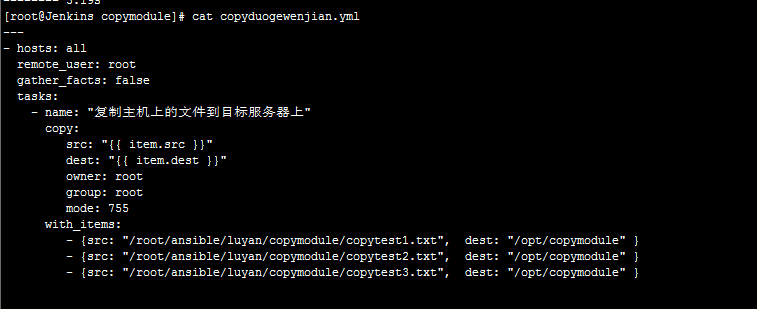ansible批量添加巡检服务器
大概思路图
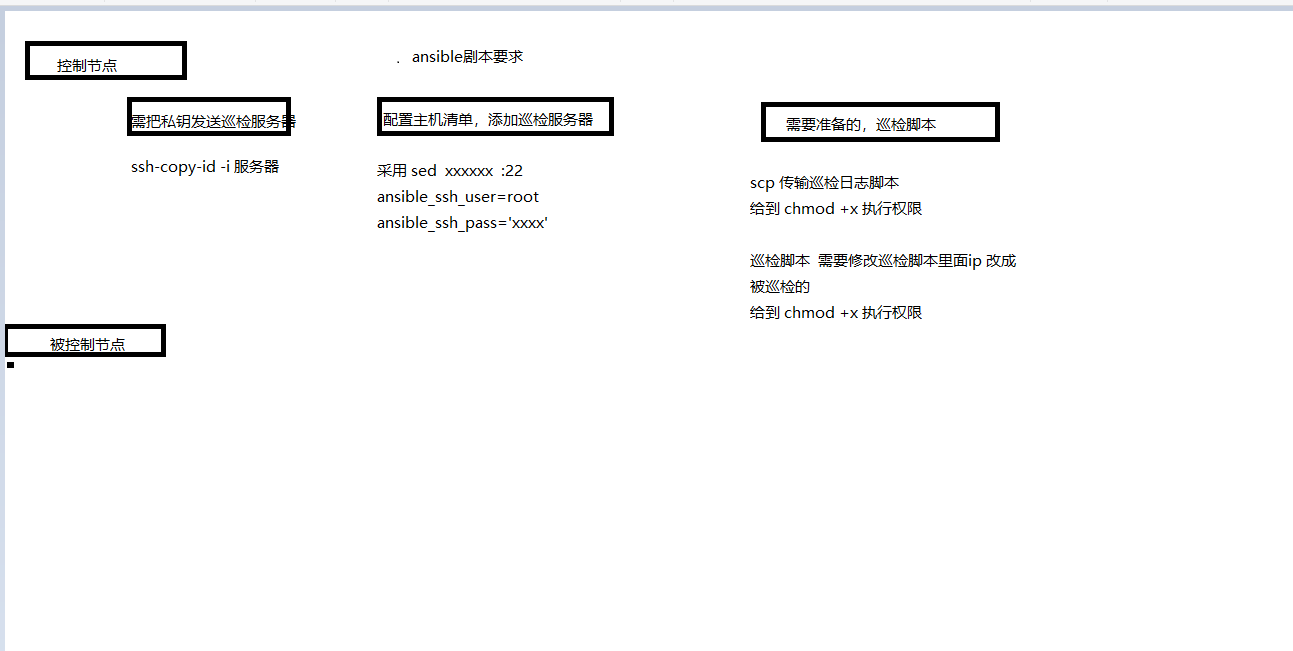
步骤一:
添加ansible主机清单
vim /etc/ansible/hosts

查看安装版本
# ansible --version
ansible 2.9.6
配置文件路径config file = /etc/ansible/ansible.cfg
查询模块路径configured module search path = [u'/root/.ansible/plugins/modules', u'/usr/share/ansible/plugins/modules']
ansible python module location = /usr/lib/python2.7/site-packages/ansible
executable location = /usr/bin/ansible
python version = 2.7.5 (default, Aug 7 2019, 00:51:29) [GCC 4.8.5 20150623 (Red Hat 4.8.5-39)]

首先配置不检测对方主机公钥
# vim ansible.cfg
[defaults]
host_key_checking = False #取消注释

二、playbook 批量推送
编写playbook文件
- hosts: ceshi
user: root
gather_facts: false #是否执行setup模块,搜集对方机器的信息
vars_files:
- /ansible/foo.yml # 设置用户名密码,设置你传输
tasks:
- name: Set authorized key taken from file
authorized_key: # 发送公钥的模块
user: root # 给这个用户发送公钥
state: present
key: "{
{ lookup('file', '/root/.ssh/id_rsa.pub') }}" # 发送本地用户的公钥路径
编辑foo.yml文件 设置密码
# vim foo.yml
ansible_ssh_pass: 1
#这里我是密码全为1 ,如果不是 请自行百度: 多主机且密码不一样时如何书写yml文件
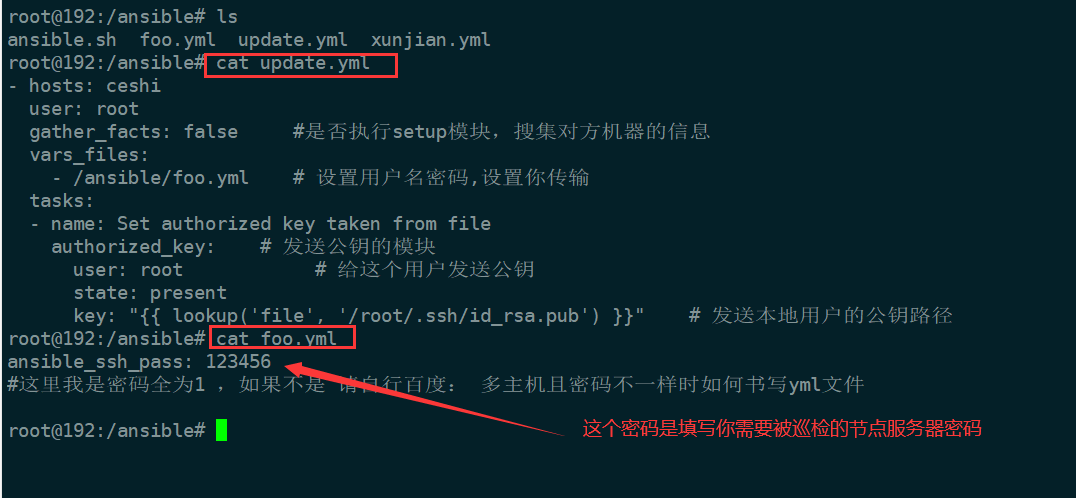
执行结果
root@192:/ansible# ansible-playbook --syntax-check update.yml #检测语法
[WARNING]: Found both group and host with same name: tomcat
playbook: update.yml
root@192:/ansible# ansible-playbook update.yml #执行语法

创建巡检目录
tasks:
- name: 创建巡检目录
shell: mkdir /xunjian

三、定义发送巡检日志脚本
创建引用变量文件
/ansible/update #当前目录
vim files.yml #创建文件,定义变量
- src_path: "/ansible/update/scp.sh"
- dest_path: "/xunjian/"

创建巡检日志脚本
root@192:/ansible/update# vim scp.sh
# !/bin/sh
#echo "$processid 请管理员注意,99.88 拼接服务暂停服务 " >>monitor.log
#echo 启动了 | mailx -s "test" [email protected] -f [email protected]
#cd /email/file/error
filelist=`ls /xunjian/log`
for file in $filelist
do
echo $file
scp /xunjian/log/$file root@xxxx:/xunjian/
rm -rf /xunjian/log/$file
done
root@192:/ansible/update# chmod +x scp.sh
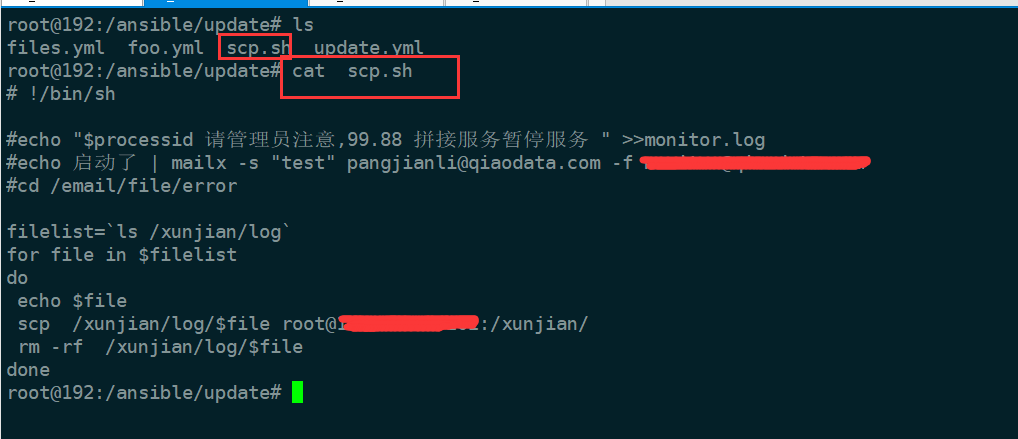
ansible-playbook剧本内容
- hosts: ceshi
user: root
gather_facts: false #是否执行setup模块,搜集对方机器的信息
vars_files:
- /ansible/update/foo.yml # 设置用户名密码,设置你传输
tasks:
- name: 执行传输公钥
authorized_key: # 发送公钥的模块
user: root # 给这个用户发送公钥
state: present
key: "{
{ lookup('file', '/root/.ssh/id_rsa.pub') }}" # 发送本地用户的公钥路径
tasks:
- name: 创建巡检目录
shell: mkdir /xunjian
vars_files: #自定义变量 调用变量文件
- /ansible/update/files.yml
tasks:
- name: 传输巡检日志脚本
copy: copy: src={
{
src_path }} dest={
{
dest_path }}
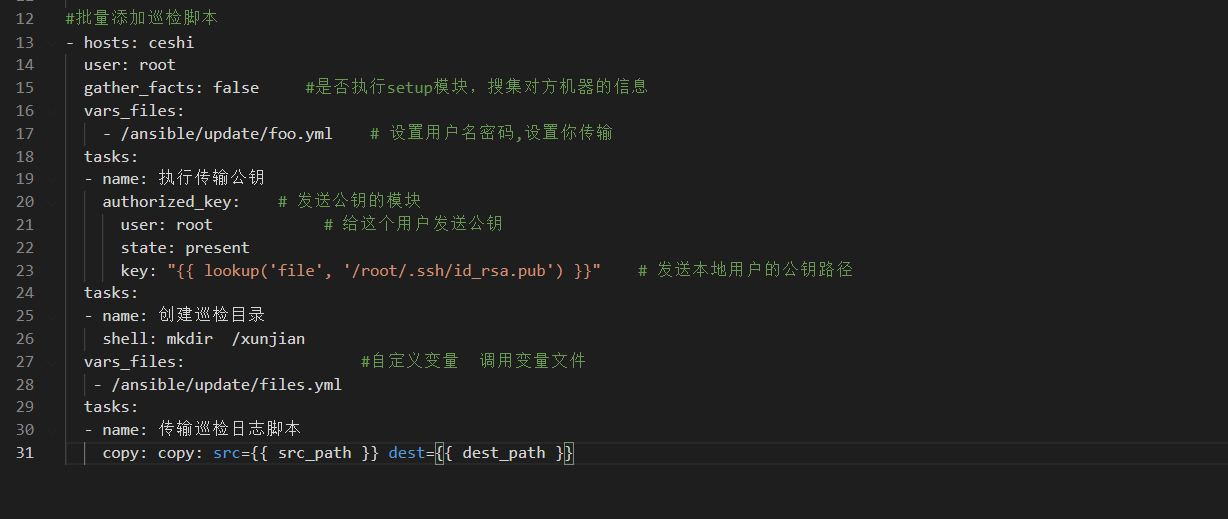
四、定义发送巡检脚本
创建引用变量文件
我这里是直接放在刚才的变量文件里面拉,改了一下名称
/ansible/update #当前目录
vim files.yml #创建文件,定义变量
#第一个是 巡检的日志,传输到控制节点脚本spc
- src_path: "/ansible/update/scp.sh"
- dest_path: "/xunjian/"
#第二个是巡检的脚本
- src_xunjian: "/ansible/update/xunjian.sh"
- dest_xunjian: "/xunjian/"

创建巡检脚本
vim xunjian.sh
#!/bin/bash
#主机信息每日巡检
IPADDR=$(ifconfig eth0|grep 'inet addr'|awk -F '[ :]' '{print $13}')
#环境变量PATH没设好,在cron里执行时有很多命令会找不到
export PATH=/usr/local/sbin:/usr/local/bin:/sbin:/bin:/usr/sbin:/usr/bin:/root/bin
source /etc/profile
[ $(id -u) -gt 0 ] && echo "请用root用户执行此脚本!" && exit 1
centosVersion=$(awk '{print $(NF-1)}' /etc/redhat-release)
VERSION="2017.08.22"
#日志相关
PROGPATH=`echo $0 | sed -e 's,[\\/][^\\/][^\\/]*$,,'`
[ -f $PROGPATH ] && PROGPATH="."
LOGPATH="$PROGPATH/log"
[ -e $LOGPATH ] || mkdir $LOGPATH
RESULTFILE="$LOGPATH/192.168.2.204.$IPADDR.txt"
#定义报表的全局变量
report_DateTime="" #日期 ok
report_Hostname="" #主机名 ok
report_OSRelease="" #发行版本 ok
report_Kernel="" #内核 ok
report_Language="" #语言/编码 ok
report_LastReboot="" #最近启动时间 ok
report_Uptime="" #运行时间(天) ok
report_CPUs="" #CPU数量 ok
report_CPUType="" #CPU类型 ok
report_Arch="" #CPU架构 ok
report_MemTotal="" #内存总容量(MB) ok
report_MemFree="" #内存剩余(MB) ok
report_MemUsedPercent="" #内存使用率% ok
report_DiskTotal="" #硬盘总容量(GB) ok
report_DiskFree="" #硬盘剩余(GB) ok
report_DiskUsedPercent="" #硬盘使用率% ok
report_InodeTotal="" #Inode总量 ok
report_InodeFree="" #Inode剩余 ok
report_InodeUsedPercent="" #Inode使用率 ok
report_IP="" #IP地址 ok
report_MAC="" #MAC地址 ok
report_Gateway="" #默认网关 ok
report_DNS="" #DNS ok
report_Listen="" #监听 ok
report_Selinux="" #Selinux ok
report_Firewall="" #防火墙 ok
report_USERs="" #用户 ok
report_USEREmptyPassword="" #空密码用户 ok
report_USERTheSameUID="" #相同ID的用户 ok
report_PasswordExpiry="" #密码过期(天) ok
report_RootUser="" #root用户 ok
report_Sudoers="" #sudo授权 ok
report_SSHAuthorized="" #SSH信任主机 ok
report_SSHDProtocolVersion="" #SSH协议版本 ok
report_SSHDPermitRootLogin="" #允许root远程登录 ok
report_DefunctProsess="" #僵尸进程数量 ok
report_SelfInitiatedService="" #自启动服务数量 ok
report_SelfInitiatedProgram="" #自启动程序数量 ok
report_RuningService="" #运行中服务数 ok
report_Crontab="" #计划任务数 ok
report_Syslog="" #日志服务 ok
report_SNMP="" #SNMP OK
report_NTP="" #NTP ok
report_JDK="" #JDK版本 ok
function version(){
echo ""
echo ""
echo "系统巡检脚本:Version $VERSION"
}
function getCpuStatus(){
echo ""
echo ""
echo "############################ CPU检查 #############################"
Physical_CPUs=$(grep "physical id" /proc/cpuinfo| sort | uniq | wc -l)
Virt_CPUs=$(grep "processor" /proc/cpuinfo | wc -l)
CPU_Kernels=$(grep "cores" /proc/cpuinfo|uniq| awk -F ': ' '{print $2}')
CPU_Type=$(grep "model name" /proc/cpuinfo | awk -F ': ' '{print $2}' | sort | uniq)
CPU_Arch=$(uname -m)
echo "物理CPU个数:$Physical_CPUs"
echo "逻辑CPU个数:$Virt_CPUs"
echo "每CPU核心数:$CPU_Kernels"
echo " CPU型号:$CPU_Type"
echo " CPU架构:$CPU_Arch"
#报表信息
report_CPUs=$Virt_CPUs #CPU数量
report_CPUType=$CPU_Type #CPU类型
report_Arch=$CPU_Arch #CPU架构
}
function getMemStatus(){
echo ""
echo ""
echo "############################ 内存检查 ############################"
if [[ $centosVersion < 7 ]];then
free -mo
else
free -h
fi
#报表信息
MemTotal=$(grep MemTotal /proc/meminfo| awk '{print $2}') #KB
MemFree=$(grep MemFree /proc/meminfo| awk '{print $2}') #KB
let MemUsed=MemTotal-MemFree
MemPercent=$(awk "BEGIN {if($MemTotal==0){printf 100}else{printf \"%.2f\",$MemUsed*100/$MemTotal}}")
report_MemTotal="$((MemTotal/1024))""MB" #内存总容量(MB)
report_MemFree="$((MemFree/1024))""MB" #内存剩余(MB)
report_MemUsedPercent="$(awk "BEGIN {if($MemTotal==0){printf 100}else{printf \"%.2f\",$MemUsed*100/$MemTotal}}")""%" #内存使用率%
}
function getDiskStatus(){
echo ""
echo ""
echo "############################ 磁盘检查 ############################"
df -hiP | sed 's/Mounted on/Mounted/'> /tmp/inode
df -hTP | sed 's/Mounted on/Mounted/'> /tmp/disk
join /tmp/disk /tmp/inode | awk '{print $1,$2,"|",$3,$4,$5,$6,"|",$8,$9,$10,$11,"|",$12}'| column -t
#报表信息
diskdata=$(df -TP | sed '1d' | awk '$2!="tmpfs"{print}') #KB
disktotal=$(echo "$diskdata" | awk '{total+=$3}END{print total}') #KB
diskused=$(echo "$diskdata" | awk '{total+=$4}END{print total}') #KB
diskfree=$((disktotal-diskused)) #KB
diskusedpercent=$(echo $disktotal $diskused | awk '{if($1==0){printf 100}else{printf "%.2f",$2*100/$1}}')
inodedata=$(df -iTP | sed '1d' | awk '$2!="tmpfs"{print}')
inodetotal=$(echo "$inodedata" | awk '{total+=$3}END{print total}')
inodeused=$(echo "$inodedata" | awk '{total+=$4}END{print total}')
inodefree=$((inodetotal-inodeused))
inodeusedpercent=$(echo $inodetotal $inodeused | awk '{if($1==0){printf 100}else{printf "%.2f",$2*100/$1}}')
report_DiskTotal=$((disktotal/1024/1024))"GB" #硬盘总容量(GB)
report_DiskFree=$((diskfree/1024/1024))"GB" #硬盘剩余(GB)
report_DiskUsedPercent="$diskusedpercent""%" #硬盘使用率%
report_InodeTotal=$((inodetotal/1000))"K" #Inode总量
report_InodeFree=$((inodefree/1000))"K" #Inode剩余
report_InodeUsedPercent="$inodeusedpercent""%" #Inode使用率%
}
function getSystemStatus(){
echo ""
echo ""
echo "############################ 系统检查 ############################"
if [ -e /etc/sysconfig/i18n ];then
default_LANG="$(grep "LANG=" /etc/sysconfig/i18n | grep -v "^#" | awk -F '"' '{print $2}')"
else
default_LANG=$LANG
fi
export LANG="en_US.UTF-8"
Release=$(cat /etc/redhat-release 2>/dev/null)
Kernel=$(uname -r)
OS=$(uname -o)
Hostname=$(uname -n)
SELinux=$(/usr/sbin/sestatus | grep "SELinux status: " | awk '{print $3}')
LastReboot=$(who -b | awk '{print $3,$4}')
uptime=$(uptime | sed 's/.*up \([^,]*\), .*/\1/')
echo " 系统:$OS"
echo " 发行版本:$Release"
echo " 内核:$Kernel"
echo " 主机名:$Hostname"
echo " SELinux:$SELinux"
echo "语言/编码:$default_LANG"
echo " 当前时间:$(date +'%F %T')"
echo " 最后启动:$LastReboot"
echo " 运行时间:$uptime"
#报表信息
report_DateTime=$(date +"%F %T") #日期
report_Hostname="$Hostname" #主机名
report_OSRelease="$Release" #发行版本
report_Kernel="$Kernel" #内核
report_Language="$default_LANG" #语言/编码
report_LastReboot="$LastReboot" #最近启动时间
report_Uptime="$uptime" #运行时间(天)
report_Selinux="$SELinux"
export LANG="$default_LANG"
}
function getServiceStatus(){
echo ""
echo ""
echo "############################ 服务检查 ############################"
echo ""
if [[ $centosVersion > 7 ]];then
conf=$(systemctl list-unit-files --type=service --state=enabled --no-pager | grep "enabled")
process=$(systemctl list-units --type=service --state=running --no-pager | grep ".service")
#报表信息
report_SelfInitiatedService="$(echo "$conf" | wc -l)" #自启动服务数量
report_RuningService="$(echo "$process" | wc -l)" #运行中服务数量
else
conf=$(/sbin/chkconfig | grep -E ":on|:启用")
process=$(/sbin/service --status-all 2>/dev/null | grep -E "is running|正在运行")
#报表信息
report_SelfInitiatedService="$(echo "$conf" | wc -l)" #自启动服务数量
report_RuningService="$(echo "$process" | wc -l)" #运行中服务数量
fi
echo "服务配置"
echo "--------"
echo "$conf" | column -t
echo ""
echo "正在运行的服务"
echo "--------------"
echo "$process"
}
function getAutoStartStatus(){
echo ""
echo ""
echo "############################ 自启动检查 ##########################"
conf=$(grep -v "^#" /etc/rc.d/rc.local| sed '/^$/d')
echo "$conf"
#报表信息
report_SelfInitiatedProgram="$(echo $conf | wc -l)" #自启动程序数量
}
function getLoginStatus(){
echo ""
echo ""
echo "############################ 登录检查 ############################"
last | head
}
function getNetworkStatus(){
echo ""
echo ""
echo "############################ 网络检查 ############################"
if [[ $centosVersion < 7 ]];then
/sbin/ifconfig -a | grep -v packets | grep -v collisions | grep -v inet6
else
#ip a
for i in $(ip link | grep BROADCAST | awk -F: '{print $2}');do ip add show $i | grep -E "BROADCAST|global"| awk '{print $2}' | tr '\n' ' ' ;echo "" ;done
fi
GATEWAY=$(ip route | grep default | awk '{print $3}')
DNS=$(grep nameserver /etc/resolv.conf| grep -v "#" | awk '{print $2}' | tr '\n' ',' | sed 's/,$//')
echo ""
echo "网关:$GATEWAY "
echo " DNS:$DNS"
#报表信息
IP=$(ip -f inet addr | grep -v 127.0.0.1 | grep inet | awk '{print $NF,$2}' | tr '\n' ',' | sed 's/,$//')
MAC=$(ip link | grep -v "LOOPBACK\|loopback" | awk '{print $2}' | sed 'N;s/\n//' | tr '\n' ',' | sed 's/,$//')
report_IP="$IP" #IP地址
report_MAC=$MAC #MAC地址
report_Gateway="$GATEWAY" #默认网关
report_DNS="$DNS" #DNS
}
function getListenStatus(){
echo ""
echo ""
echo "############################ 监听检查 ############################"
TCPListen=$(ss -ntul | column -t)
echo "$TCPListen"
#报表信息
report_Listen="$(echo "$TCPListen"| sed '1d' | awk '/tcp/ {print $5}' | awk -F: '{print $NF}' | sort | uniq | wc -l)"
}
function getCronStatus(){
echo ""
echo ""
echo "############################ 计划任务检查 ########################"
Crontab=0
for shell in $(grep -v "/sbin/nologin" /etc/shells);do
for user in $(grep "$shell" /etc/passwd| awk -F: '{print $1}');do
crontab -l -u $user >/dev/null 2>&1
status=$?
if [ $status -eq 0 ];then
echo "$user"
echo "--------"
crontab -l -u $user
let Crontab=Crontab+$(crontab -l -u $user | wc -l)
echo ""
fi
done
done
#计划任务
find /etc/cron* -type f | xargs -i ls -l {
} | column -t
let Crontab=Crontab+$(find /etc/cron* -type f | wc -l)
#报表信息
report_Crontab="$Crontab" #计划任务数
}
function getHowLongAgo(){
# 计算一个时间戳离现在有多久了
datetime="$*"
[ -z "$datetime" ] && echo "错误的参数:getHowLongAgo() $*"
Timestamp=$(date +%s -d "$datetime") #转化为时间戳
Now_Timestamp=$(date +%s)
Difference_Timestamp=$(($Now_Timestamp-$Timestamp))
days=0;hours=0;minutes=0;
sec_in_day=$((60*60*24));
sec_in_hour=$((60*60));
sec_in_minute=60
while (( $(($Difference_Timestamp-$sec_in_day)) > 1 ))
do
let Difference_Timestamp=Difference_Timestamp-sec_in_day
let days++
done
while (( $(($Difference_Timestamp-$sec_in_hour)) > 1 ))
do
let Difference_Timestamp=Difference_Timestamp-sec_in_hour
let hours++
done
echo "$days 天 $hours 小时前"
}
function getUserLastLogin(){
# 获取用户最近一次登录的时间,含年份
# 很遗憾last命令不支持显示年份,只有"last -t YYYYMMDDHHMMSS"表示某个时间之间的登录,我
# 们只能用最笨的方法了,对比今天之前和今年元旦之前(或者去年之前和前年之前……)某个用户
# 登录次数,如果登录统计次数有变化,则说明最近一次登录是今年。
username=$1
: ${username:="`whoami`"}
thisYear=$(date +%Y)
oldesYear=$(last | tail -n1 | awk '{print $NF}')
while(( $thisYear >= $oldesYear));do
loginBeforeToday=$(last $username | grep $username | wc -l)
loginBeforeNewYearsDayOfThisYear=$(last $username -t $thisYear"0101000000" | grep $username | wc -l)
if [ $loginBeforeToday -eq 0 ];then
echo "从未登录过"
break
elif [ $loginBeforeToday -gt $loginBeforeNewYearsDayOfThisYear ];then
lastDateTime=$(last -i $username | head -n1 | awk '{
for(i=4;i<(NF-2);i++)printf"%s ",$i}')" $thisYear" #格式如: Sat Nov 2 20:33 2015
lastDateTime=$(date "+%Y-%m-%d %H:%M:%S" -d "$lastDateTime")
echo "$lastDateTime"
break
else
thisYear=$((thisYear-1))
fi
done
}
function getUserStatus(){
echo ""
echo ""
echo "############################ 用户检查 ############################"
#/etc/passwd 最后修改时间
pwdfile="$(cat /etc/passwd)"
Modify=$(stat /etc/passwd | grep Modify | tr '.' ' ' | awk '{
print $2,$3}')
echo "/etc/passwd 最后修改时间:$Modify ($(getHowLongAgo $Modify))"
echo ""
echo "特权用户"
echo "--------"
RootUser=""
for user in $(echo "$pwdfile" | awk -F: '{
print $1}');do
if [ $(id -u $user) -eq 0 ];then
echo "$user"
RootUser="$RootUser,$user"
fi
done
echo ""
echo "用户列表"
echo "--------"
USERs=0
echo "$(
echo "用户名 UID GID HOME SHELL 最后一次登录"
for shell in $(grep -v "/sbin/nologin" /etc/shells);do
for username in $(grep "$shell" /etc/passwd| awk -F: '{
print $1}');do
userLastLogin="$(getUserLastLogin $username)"
echo "$pwdfile" | grep -w "$username" |grep -w "$shell"| awk -F: -v lastlogin="$(echo "$userLastLogin" | tr ' ' '_')" '{
print $1,$3,$4,$6,$7,lastlogin}'
done
let USERs=USERs+$(echo "$pwdfile" | grep "$shell"| wc -l)
done
)" | column -t
echo ""
echo "空密码用户"
echo "----------"
USEREmptyPassword=""
for shell in $(grep -v "/sbin/nologin" /etc/shells);do
for user in $(echo "$pwdfile" | grep "$shell" | cut -d: -f1);do
r=$(awk -F: '$2=="!!"{
print $1}' /etc/shadow | grep -w $user)
if [ ! -z $r ];then
echo $r
USEREmptyPassword="$USEREmptyPassword,"$r
fi
done
done
echo ""
echo "相同ID的用户"
echo "------------"
USERTheSameUID=""
UIDs=$(cut -d: -f3 /etc/passwd | sort | uniq -c | awk '$1>1{
print $2}')
for uid in $UIDs;do
echo -n "$uid";
USERTheSameUID="$uid"
r=$(awk -F: 'ORS="";$3=='"$uid"'{
print ":",$1}' /etc/passwd)
echo "$r"
echo ""
USERTheSameUID="$USERTheSameUID $r,"
done
#报表信息
report_USERs="$USERs" #用户
report_USEREmptyPassword=$(echo $USEREmptyPassword | sed 's/^,//')
report_USERTheSameUID=$(echo $USERTheSameUID | sed 's/,$//')
report_RootUser=$(echo $RootUser | sed 's/^,//') #特权用户
}
function getPasswordStatus {
echo ""
echo ""
echo "############################ 密码检查 ############################"
pwdfile="$(cat /etc/passwd)"
echo ""
echo "密码过期检查"
echo "------------"
result=""
for shell in $(grep -v "/sbin/nologin" /etc/shells);do
for user in $(echo "$pwdfile" | grep "$shell" | cut -d: -f1);do
get_expiry_date=$(/usr/bin/chage -l $user | grep 'Password expires' | cut -d: -f2)
if [[ $get_expiry_date = ' never' || $get_expiry_date = 'never' ]];then
printf "%-15s 永不过期\n" $user
result="$result,$user:never"
else
password_expiry_date=$(date -d "$get_expiry_date" "+%s")
current_date=$(date "+%s")
diff=$(($password_expiry_date-$current_date))
let DAYS=$(($diff/(60*60*24)))
printf "%-15s %s天后过期\n" $user $DAYS
result="$result,$user:$DAYS days"
fi
done
done
report_PasswordExpiry=$(echo $result | sed 's/^,//')
echo ""
echo "密码策略检查"
echo "------------"
grep -v "#" /etc/login.defs | grep -E "PASS_MAX_DAYS|PASS_MIN_DAYS|PASS_MIN_LEN|PASS_WARN_AGE"
}
function getSudoersStatus(){
echo ""
echo ""
echo "############################ Sudoers检查 #########################"
conf=$(grep -v "^#" /etc/sudoers| grep -v "^Defaults" | sed '/^$/d')
echo "$conf"
echo ""
#报表信息
report_Sudoers="$(echo $conf | wc -l)"
}
function getInstalledStatus(){
echo ""
echo ""
echo "############################ 软件检查 ############################"
rpm -qa --last | head | column -t
}
function getProcessStatus(){
echo ""
echo ""
echo "############################ 进程检查 ############################"
if [ $(ps -ef | grep defunct | grep -v grep | wc -l) -ge 1 ];then
echo ""
echo "僵尸进程";
echo "--------"
ps -ef | head -n1
ps -ef | grep defunct | grep -v grep
fi
echo ""
echo "内存占用TOP10"
echo "-------------"
echo -e "PID %MEM RSS COMMAND
$(ps aux | awk '{
print $2, $4, $6, $11}' | sort -k3rn | head -n 10 )"| column -t
echo ""
echo "CPU占用TOP10"
echo "------------"
top b -n1 | head -17 | tail -11
#报表信息
report_DefunctProsess="$(ps -ef | grep defunct | grep -v grep|wc -l)"
}
function getJDKStatus(){
echo ""
echo ""
echo "############################ JDK检查 #############################"
java -version 2>/dev/null
if [ $? -eq 0 ];then
java -version 2>&1
fi
echo "JAVA_HOME=\"$JAVA_HOME\""
#报表信息
report_JDK="$(java -version 2>&1 | grep version | awk '{
print $1,$3}' | tr -d '"')"
}
function getSyslogStatus(){
echo ""
echo ""
echo "############################ syslog检查 ##########################"
echo "服务状态:$(getState rsyslog)"
echo ""
echo "/etc/rsyslog.conf"
echo "-----------------"
cat /etc/rsyslog.conf 2>/dev/null | grep -v "^#" | grep -v "^\\$" | sed '/^$/d' | column -t
#报表信息
report_Syslog="$(getState rsyslog)"
}
function getFirewallStatus(){
echo ""
echo ""
echo "############################ 防火墙检查 ##########################"
#防火墙状态,策略等
if [[ $centosVersion < 7 ]];then
/etc/init.d/iptables status >/dev/null 2>&1
status=$?
if [ $status -eq 0 ];then
s="active"
elif [ $status -eq 3 ];then
s="inactive"
elif [ $status -eq 4 ];then
s="permission denied"
else
s="unknown"
fi
else
s="$(getState iptables)"
fi
echo "iptables: $s"
echo ""
echo "/etc/sysconfig/iptables"
echo "-----------------------"
cat /etc/sysconfig/iptables 2>/dev/null
#报表信息
report_Firewall="$s"
}
function getSNMPStatus(){
#SNMP服务状态,配置等
echo ""
echo ""
echo "############################ SNMP检查 ############################"
status="$(getState snmpd)"
echo "服务状态:$status"
echo ""
if [ -e /etc/snmp/snmpd.conf ];then
echo "/etc/snmp/snmpd.conf"
echo "--------------------"
cat /etc/snmp/snmpd.conf 2>/dev/null | grep -v "^#" | sed '/^$/d'
fi
#报表信息
report_SNMP="$(getState snmpd)"
}
function getState(){
if [[ $centosVersion < 7 ]];then
if [ -e "/etc/init.d/$1" ];then
if [ `/etc/init.d/$1 status 2>/dev/null | grep -E "is running|正在运行" | wc -l` -ge 1 ];then
r="active"
else
r="inactive"
fi
else
r="unknown"
fi
else
#CentOS 7+
r="$(systemctl is-active $1 2>&1)"
fi
echo "$r"
}
function getSSHStatus(){
#SSHD服务状态,配置,受信任主机等
echo ""
echo ""
echo "############################ SSH检查 #############################"
#检查受信任主机
pwdfile="$(cat /etc/passwd)"
echo "服务状态:$(getState sshd)"
Protocol_Version=$(cat /etc/ssh/sshd_config | grep Protocol | awk '{print $2}')
echo "SSH协议版本:$Protocol_Version"
echo ""
echo "信任主机"
echo "--------"
authorized=0
for user in $(echo "$pwdfile" | grep /bin/bash | awk -F: '{print $1}');do
authorize_file=$(echo "$pwdfile" | grep -w $user | awk -F: '{printf $6"/.ssh/authorized_keys"}')
authorized_host=$(cat $authorize_file 2>/dev/null | awk '{print $3}' | tr '\n' ',' | sed 's/,$//')
if [ ! -z $authorized_host ];then
echo "$user 授权 \"$authorized_host\" 无密码访问"
fi
let authorized=authorized+$(cat $authorize_file 2>/dev/null | awk '{print $3}'|wc -l)
done
echo ""
echo "是否允许ROOT远程登录"
echo "--------------------"
config=$(cat /etc/ssh/sshd_config | grep PermitRootLogin)
firstChar=${config:0:1}
if [ $firstChar == "#" ];then
PermitRootLogin="yes" #默认是允许ROOT远程登录的
else
PermitRootLogin=$(echo $config | awk '{print $2}')
fi
echo "PermitRootLogin $PermitRootLogin"
echo ""
echo "/etc/ssh/sshd_config"
echo "--------------------"
cat /etc/ssh/sshd_config | grep -v "^#" | sed '/^$/d'
#报表信息
report_SSHAuthorized="$authorized" #SSH信任主机
report_SSHDProtocolVersion="$Protocol_Version" #SSH协议版本
report_SSHDPermitRootLogin="$PermitRootLogin" #允许root远程登录
}
function getNTPStatus(){
#NTP服务状态,当前时间,配置等
echo ""
echo ""
echo "############################ NTP检查 #############################"
if [ -e /etc/ntp.conf ];then
echo "服务状态:$(getState ntpd)"
echo ""
echo "/etc/ntp.conf"
echo "-------------"
cat /etc/ntp.conf 2>/dev/null | grep -v "^#" | sed '/^$/d'
fi
#报表信息
report_NTP="$(getState ntpd)"
}
function uploadHostDailyCheckReport(){
json="{
\"DateTime\":\"$report_DateTime\",
\"Hostname\":\"$report_Hostname\",
\"OSRelease\":\"$report_OSRelease\",
\"Kernel\":\"$report_Kernel\",
\"Language\":\"$report_Language\",
\"LastReboot\":\"$report_LastReboot\",
\"Uptime\":\"$report_Uptime\",
\"CPUs\":\"$report_CPUs\",
\"CPUType\":\"$report_CPUType\",
\"Arch\":\"$report_Arch\",
\"MemTotal\":\"$report_MemTotal\",
\"MemFree\":\"$report_MemFree\",
\"MemUsedPercent\":\"$report_MemUsedPercent\",
\"DiskTotal\":\"$report_DiskTotal\",
\"DiskFree\":\"$report_DiskFree\",
\"DiskUsedPercent\":\"$report_DiskUsedPercent\",
\"InodeTotal\":\"$report_InodeTotal\",
\"InodeFree\":\"$report_InodeFree\",
\"InodeUsedPercent\":\"$report_InodeUsedPercent\",
\"IP\":\"$report_IP\",
\"MAC\":\"$report_MAC\",
\"Gateway\":\"$report_Gateway\",
\"DNS\":\"$report_DNS\",
\"Listen\":\"$report_Listen\",
\"Selinux\":\"$report_Selinux\",
\"Firewall\":\"$report_Firewall\",
\"USERs\":\"$report_USERs\",
\"USEREmptyPassword\":\"$report_USEREmptyPassword\",
\"USERTheSameUID\":\"$report_USERTheSameUID\",
\"PasswordExpiry\":\"$report_PasswordExpiry\",
\"RootUser\":\"$report_RootUser\",
\"Sudoers\":\"$report_Sudoers\",
\"SSHAuthorized\":\"$report_SSHAuthorized\",
\"SSHDProtocolVersion\":\"$report_SSHDProtocolVersion\",
\"SSHDPermitRootLogin\":\"$report_SSHDPermitRootLogin\",
\"DefunctProsess\":\"$report_DefunctProsess\",
\"SelfInitiatedService\":\"$report_SelfInitiatedService\",
\"SelfInitiatedProgram\":\"$report_SelfInitiatedProgram\",
\"RuningService\":\"$report_RuningService\",
\"Crontab\":\"$report_Crontab\",
\"Syslog\":\"$report_Syslog\",
\"SNMP\":\"$report_SNMP\",
\"NTP\":\"$report_NTP\",
\"JDK\":\"$report_JDK\"
}"
#echo "$json"
curl -l -H "Content-type: application/json" -X POST -d "$json" "$uploadHostDailyCheckReportApi" 2>/dev/null
}
function check(){
version
getSystemStatus
getCpuStatus
getMemStatus
getDiskStatus
getNetworkStatus
getListenStatus
getProcessStatus
getServiceStatus
getAutoStartStatus
getLoginStatus
getCronStatus
getUserStatus
getPasswordStatus
getSudoersStatus
getJDKStatus
getFirewallStatus
getSSHStatus
getSyslogStatus
getSNMPStatus
getNTPStatus
getInstalledStatus
}
#执行检查并保存检查结果
check > $RESULTFILE
echo "检查结果:$RESULTFILE"
使用sed流编译器
我们这里需求是修改一下巡检的脚本,让他根据巡检的服务器ip定义巡检日志名称
sed -i 's#192.168.2.204#192.168.2.64#' /ansible/update/xunjian.sh
查看这里已经更改
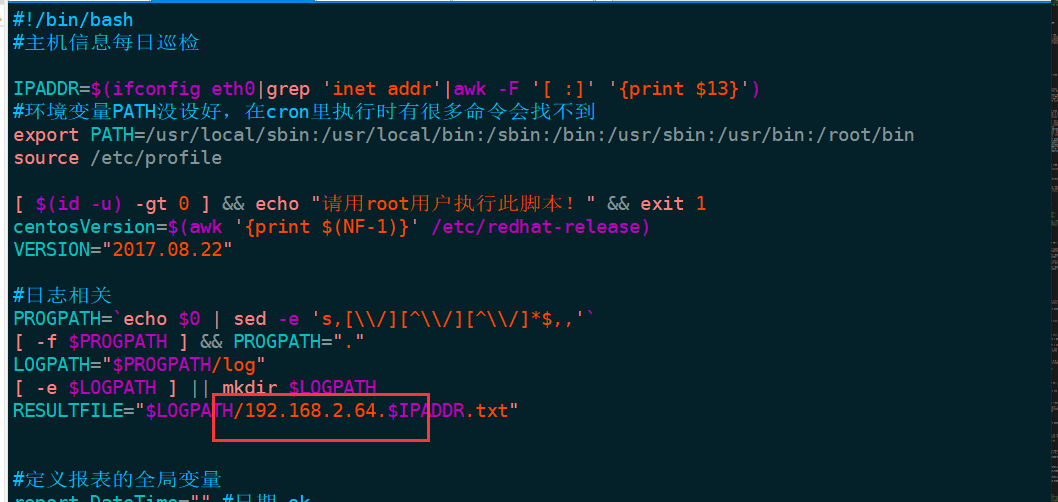
ansible-playbook剧本内容S
- hosts: ceshi
user: root
gather_facts: false #是否执行setup模块,搜集对方机器的信息
vars_files:
- /ansible/update/foo.yml # 设置用户名密码,设置你传输
tasks:
- name: 执行传输公钥
authorized_key: # 发送公钥的模块
user: root # 给这个用户发送公钥
state: present
key: "{
{ lookup('file', '/root/.ssh/id_rsa.pub') }}" # 发送本地用户的公钥路径
tasks:
- name: 创建巡检目录
shell: mkdir /xunjian
vars_files: #自定义变量 调用变量文件
- /ansible/update/files.yml
tasks:
- name: 传输巡检日志脚本
copy: src={
{
src_path }} dest={
{
dest_path }}
- name: 传输巡检日志脚本
copy: src={
{
src_xunjian }} dest={
{
dest_path }}
- name: sed 修改ip
shell: sed -i 's#192.168.2.204#192.168.2.64#' /xunjian/xunjian.sh
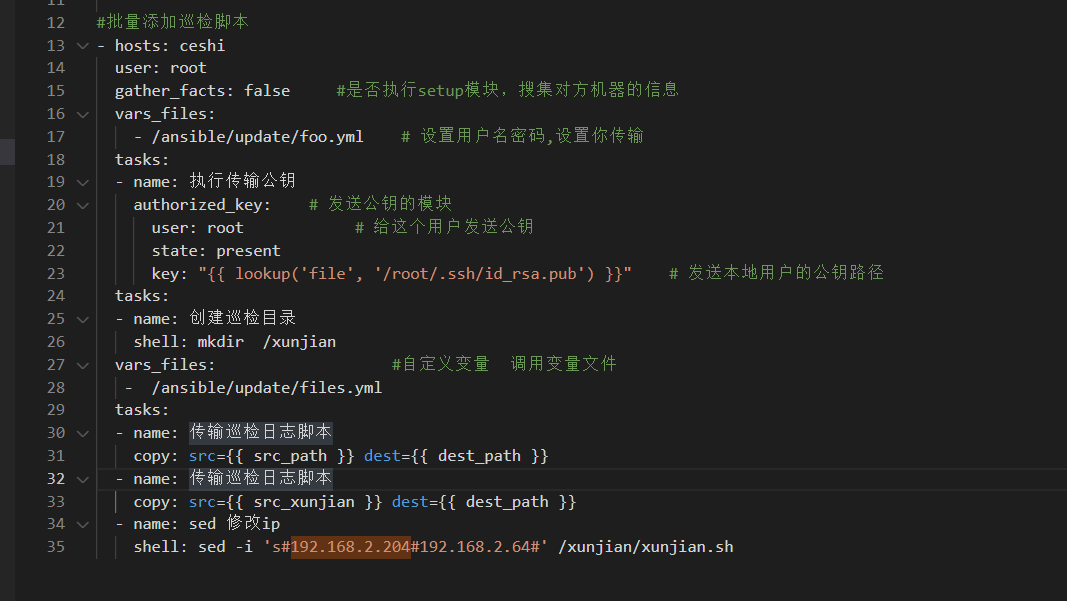
测试
检测语法
ansible-playbook --syntax-check update.yml
playbook: update.yml
root@192:/ansible/update# ansible-playbook update.yml
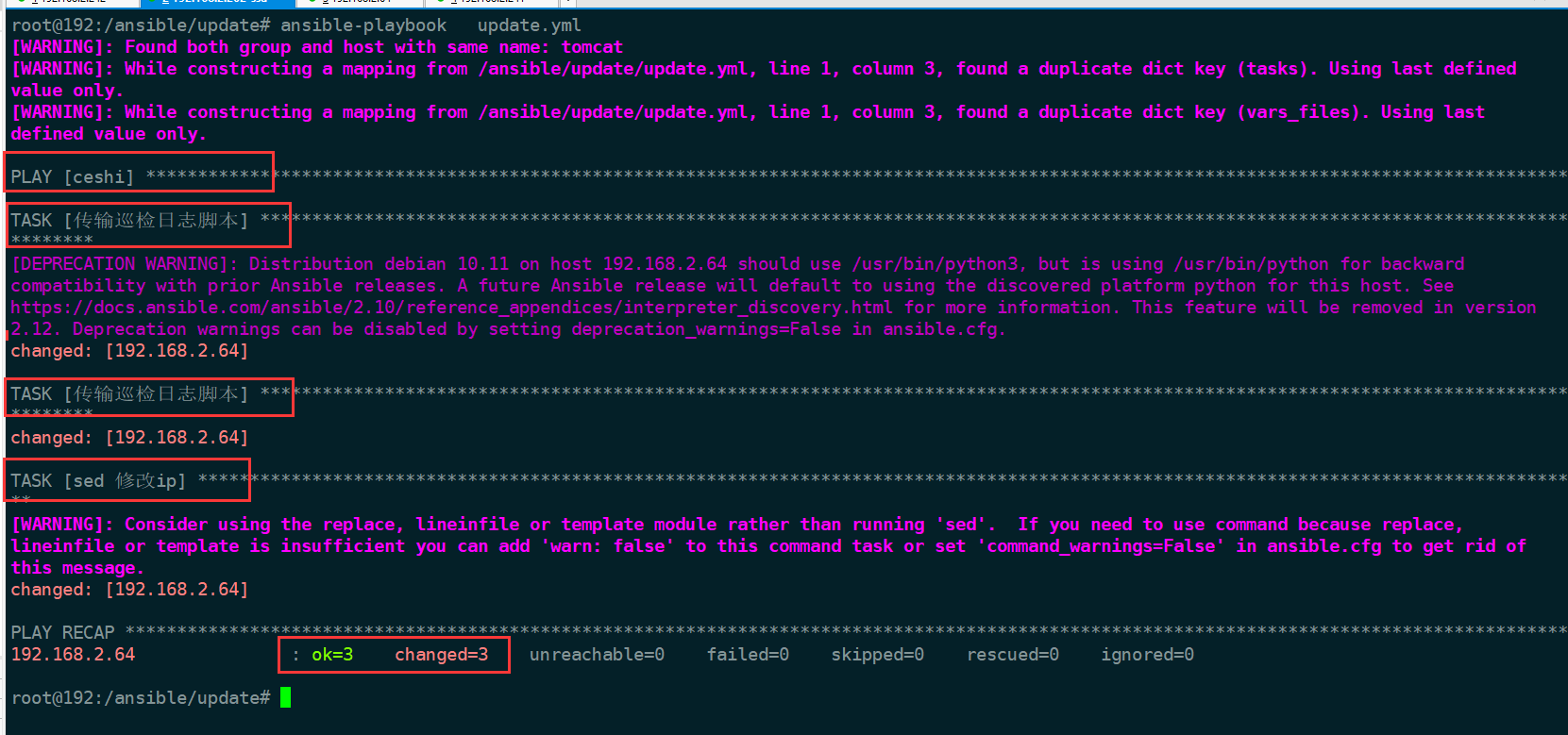
查看验证
查看目录是否创建
root@dev03:/# cd /xunjian/
root@dev03:/xunjian# ls
scp.sh xunjian.sh
root@dev03:/xunjian# ls -l
total 28
-rw-r--r-- 1 root root 355 Aug 5 02:46 scp.sh
-rw-r--r-- 1 root root 21804 Aug 5 02:46 xunjian.sh
root@dev03:/xunjian# cat xunjian.sh |grep 192
RESULTFILE="$LOGPATH/192.168.2.64.$IPADDR.txt"
没有执行权限 最后在加上

完整版ansible-playbook
#批量添加巡检脚本
- hosts: ceshi
user: root
gather_facts: false #是否执行setup模块,搜集对方机器的信息
vars_files:
- /ansible/update/foo.yml # 设置用户名密码,设置你传输
tasks:
- name: 执行传输公钥
authorized_key: # 发送公钥的模块
user: root # 给这个用户发送公钥
state: present
key: "{
{ lookup('file', '/root/.ssh/id_rsa.pub') }}" # 发送本地用户的公钥路径
tasks:
- name: 创建巡检目录
shell: mkdir /xunjian
vars_files: #自定义变量 调用变量文件
- /ansible/update/files.yml
tasks:
- name: 传输巡检日志脚本
copy: src={
{
src_path }} dest={
{
dest_path }} mode=755
- name: 传输巡检日志脚本
copy: src={
{
src_xunjian }} dest={
{
dest_path }} mode=755
- name: sed 修改ip
shell: sed -i 's#192.168.2.204#192.168.2.64#' /xunjian/xunjian.sh
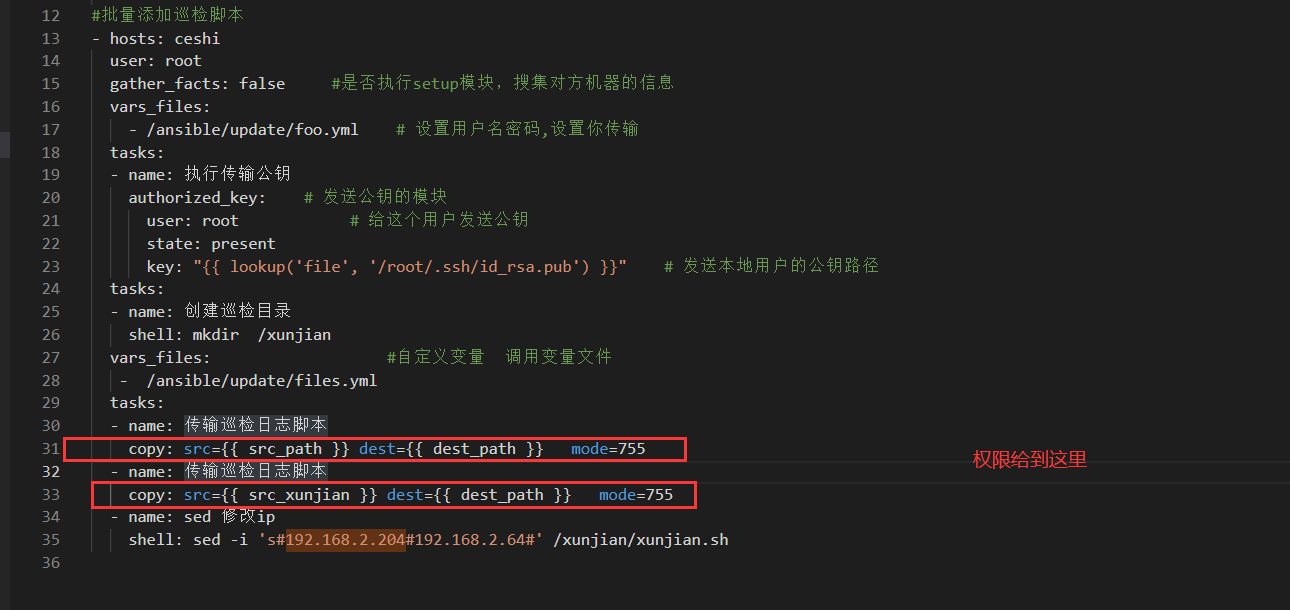
解决没有执行权限
copy模块的作用就是拷贝文件,将ansible主机上的文件拷贝到远程主机中。
src参数 :用于指定需要copy的文件或目录
dest参数 :用于指定文件将被拷贝到远程主机的哪个目录中,dest为必须参数
content参数 :当不使用src指定拷贝的文件时,可以使用content直接指定文件内容,src与content两个参数必有其一,否则会报错。
force参数 : 当远程主机的目标路径中已经存在同名文件,并且与ansible主机中的文件内容不同时,是否强制覆盖,可选值有yes和no,默认值为yes,表示覆盖,如果设置为no,则不会执行覆盖拷贝操作,远程主机中的文件保持不变。
backup参数 : 当远程主机的目标路径中已经存在同名文件,并且与ansible主机中的文件内容不同时,是否对远程主机的文件进行备份,可选值有yes和no,当设置为yes时,会先备份远程主机中的文件,然后再将ansible主机中的文件拷贝到远程主机。
owner参数 : 指定文件拷贝到远程主机后的属主,但是远程主机上必须有对应的用户,否则会报错。
group参数 : 指定文件拷贝到远程主机后的属组,但是远程主机上必须有对应的组,否则会报错。
mode参数 : 指定文件拷贝到远程主机后的权限,如果你想将权限设置为"rw-r--r--",则可以使用mode=0644表示,如果你想要在user对应的权限位上添加执行权限,则可以使用mode=u+x表示
拷贝单个文件到目标服务器 实例
[root@Jenkins copymodule]# cat copy.yml
---
- hosts: all
remote_user: root
gather_facts: false
tasks:
- name: "复制主机上的文件到目标服务器上"
copy:
src: "/root/ansible/luyan/copymodule/copytest1.txt"
dest: "/opt/copymodule"
owner: root
group: root
mode: 755
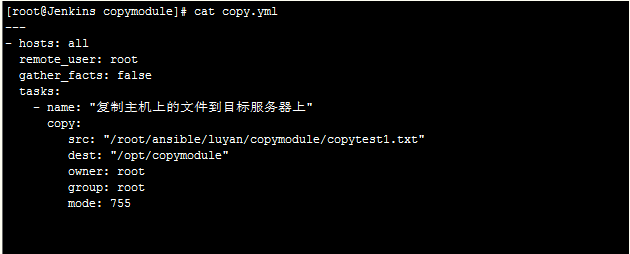
拷贝多个文件到目标服务器
[root@Jenkins copymodule]# cat copyduogewenjian.yml
---
- hosts: all
remote_user: root
gather_facts: false
tasks:
- name: "复制主机上的文件到目标服务器上"
copy:
src: "{
{ item.src }}"
dest: "{
{ item.dest }}"
owner: root
group: root
mode: 755
with_items:
- {
src: "/root/ansible/luyan/copymodule/copytest1.txt", dest: "/opt/copymodule" }
- {
src: "/root/ansible/luyan/copymodule/copytest2.txt", dest: "/opt/copymodule" }
- {
src: "/root/ansible/luyan/copymodule/copytest3.txt", dest: "/opt/copymodule" }
则会报错。
group参数 : 指定文件拷贝到远程主机后的属组,但是远程主机上必须有对应的组,否则会报错。
mode参数 : 指定文件拷贝到远程主机后的权限,如果你想将权限设置为"rw-r–r–",则可以使用mode=0644表示,如果你想要在user对应的权限位上添加执行权限,则可以使用mode=u+x表示
###### 拷贝单个文件到目标服务器 实例
```shell
[root@Jenkins copymodule]# cat copy.yml
---
- hosts: all
remote_user: root
gather_facts: false
tasks:
- name: "复制主机上的文件到目标服务器上"
copy:
src: "/root/ansible/luyan/copymodule/copytest1.txt"
dest: "/opt/copymodule"
owner: root
group: root
mode: 755
[外链图片转存中…(img-2YyCR6ph-1659685367350)]
拷贝多个文件到目标服务器
[root@Jenkins copymodule]# cat copyduogewenjian.yml
---
- hosts: all
remote_user: root
gather_facts: false
tasks:
- name: "复制主机上的文件到目标服务器上"
copy:
src: "{
{ item.src }}"
dest: "{
{ item.dest }}"
owner: root
group: root
mode: 755
with_items:
- {
src: "/root/ansible/luyan/copymodule/copytest1.txt", dest: "/opt/copymodule" }
- {
src: "/root/ansible/luyan/copymodule/copytest2.txt", dest: "/opt/copymodule" }
- {
src: "/root/ansible/luyan/copymodule/copytest3.txt", dest: "/opt/copymodule" }
